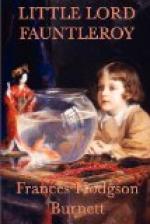He bent down and stood a minute or so looking at the happy, sleeping face. His shaggy eyebrows were knitted fiercely, and yet somehow he did not seem fierce at all. He put up his hand, pushed the bright hair back from the forehead, and then turned away and rang the bell.
When the largest footman appeared, he pointed to the sofa.
“Take”—he said, and then his voice changed a little—“take Lord Fauntleroy to his room.”
XI
When Mr. Hobbs’s young friend left him to go to Dorincourt Castle and become Lord Fauntleroy, and the grocery-man had time to realize that the Atlantic Ocean lay between himself and the small companion who had spent so many agreeable hours in his society, he really began to feel very lonely indeed. The fact was, Mr. Hobbs was not a clever man nor even a bright one; he was, indeed, rather a slow and heavy person, and he had never made many acquaintances. He was not mentally energetic enough to know how to amuse himself, and in truth he never did anything of an entertaining nature but read the newspapers and add up his accounts. It was not very easy for him to add up his accounts, and sometimes it took him a long time to bring them out right; and in the old days, little Lord Fauntleroy, who had learned how to add up quite nicely with his fingers and a slate and pencil, had sometimes even gone to the length of trying to help him; and, then too, he had been so good a listener and had taken such an interest in what the newspaper said, and he and Mr. Hobbs had held such long conversations about the Revolution and the British and the elections and the Republican party, that it was no wonder his going left a blank in the grocery store. At first it seemed to Mr. Hobbs that Cedric was not really far away, and would come back again; that some day he would look up from his paper and see the little lad standing in the door-way, in his white suit and red stockings, and with his straw hat on the back of his head, and would hear him say in his cheerful little voice: “Hello, Mr. Hobbs! This is a hot day—isn’t it?” But as the days passed on and this did not happen, Mr. Hobbs felt very dull and uneasy. He did not even enjoy his newspaper as much as he used to. He would put the paper down on his knee after reading it, and sit and stare at the high stool for a long time. There were some marks on the long legs which made him feel quite dejected and melancholy. They were marks made by the heels of the next Earl of Dorincourt, when he kicked and talked at the same time. It seems that even youthful earls kick the legs of things they sit on;—noble blood and lofty lineage do not prevent it. After looking at those marks, Mr. Hobbs would take out his gold watch and open it and stare at the inscription: “From his oldest friend, Lord Fauntleroy, to Mr. Hobbs. When this you see, remember me.” And after staring at it awhile, he would shut it up with a loud snap, and sigh and get up and go and stand




